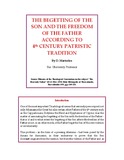| dc.description.abstract | One of the most important Triadological issues that seriously preoccupied not only Athanasius the Great but also certain other Fathers of the 4th century such as the Cappadocians, Didymus the Blind and Epiphanios of Cyprus, was the matter of associating the begetting of the Son with the freedom of the Father - that is: if and to what extent the begetting of the Son affects the freedom of the Father or not, or, in other words, if the Father begat the Son of His own volition or involuntarily.
This problem – in the form of a pressing dilemma – had been posed by the Arians for discussion, in their endeavour to prove that the Son does not originate from the essence, but from the volition of the Father and as such, the Son must be a creation. In fact, it was for this reason that they had even adopted a metaphysical axiom of Aristotelian origin, according to which, whatever is made “per nature” or “per essence” is made “out of necessity”, whereas whatever is made “per volition”, that alone is made freely 1. Thus, they asserted, if the Son indeed originated from the essence and not the volition of the Father, then the Father must have acquired a Son out of necessity and contrary to His volition. As they characteristically used to say: « If He (the Son) wasn’t by volition, then it was out of necessity and by not wanting to, that God had the Son » [Ει μη βουλήσει γέγονεν, ουκούν ανάγκη και μη θέλων έσχεν ο Θεός Υιόν ] 2. According to them, the only way that divine freedom could be preserved was if the dependence of the Son’s existence –just as every other, created being’s existence– depended solely and exclusively on the volition of the Father 3.
On the basis therefore of these presuppositions, the Arians presented the Orthodox the following, pressing dilemma, in the form of a question: « Did the Father want to beget the Son, or not want to? » [ Θέλων εγέννησεν ο Πατήρ τον Υιόν, ή μη θέλων; ] 4. The objective of this extortive dilemma was obvious: If the Orthodox were to reply that the Father begat the Son voluntarily (θέλων), then they must necessarily be conceding that the Son does not differ ontologically to any of the other creations. If again they were to reply that the Father begat the Son involuntarily (μη θέλων), then they would be forced to concede that the Son was begotten of the Father out of necessity – something entirely inadmissible, because it would have placed doubt, even on the very godhood of the Father 5.
The reply given by the aforementioned Fathers to the Triadological problem that was posed by means of the crafty Arian dilemma was a most significant one for the development of the Dogma on the Trinity during the 4th century, and is exceptionally opportune in our day, on account of the related, theological-philosophical concerns that have been observed recently in the inter-Orthodox sphere, and especially in our own country. | en_UK |


